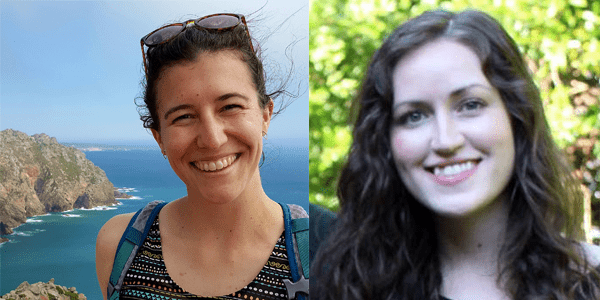UW Bioengineering Ph.D. students Alissa Bleem and Hannah Frizzell have received NSF Graduate Research Opportunities Worldwide (GROW) fellowships. The GROW program expands opportunities for US graduate students to engage in international research collaboration, and is open only to active awardees of the NSF’s Graduate Research Fellowship Program (GRFP).
Alissa Bleem, who is coadvised by James Bryers and Valerie Daggett, professors of bioengineering, will travel to Aarhus University in Denmark. At UW, she applies computational protein design and molecular dynamics simulations to engineer novel antimicrobial agents. She is working to design small peptides to prevent the formation of amyloid structures in the extracellular matrix of bacterial biofilms. The goal of this work is to improve outcomes for biofilm-associated infections.
In Denmark, Alissa will work with Dr. Daniel Otzen’s Protein Biophysics Group investigate strategies to target pseudomonas aeruginosa, a multi-drug resistant bacterium that is a prominent cause of health care related infections, and that produces amyloid fibrils as a mechanism of virulence. The team aims to develop new, robust compounds that target the amyloid fibril formation in pseudomonal biofilms. They will also work to characterize the biophysics of amyloid formation in bacteria.
Hannah Frizzell, who is advised by Associate Professor Kim Woodrow, is headed to the University of Melbourne in Australia. Hannah is completing the final year of her three-year Roche/ARCS Foundation Fellowship. In Dr. Woodrow’s lab, she develops biomaterials for the oral delivery of vaccines. She is working to design biomaterials-based delivery platforms that can overcome the physiochemical barriers of the gastrointestinal tract. She also aims to understand the mechanisms of antigen uptake at the GI tract’s mucosal surfaces, and the role of crosstalk between intestinal epithelial cells and immune cells in improving the immune response to orally administered vaccines.
Hannah will collaborate with Dr. Laura McKay of the Peter Doherty Institute for Infection and Immunity to advance the development of tissue-resident memory T cells for rational vaccine design. She will examine the role of immunological memory in T cells, which are involved in the detection and clearance of pathogens, and in protection against infectious diseases. Recently, a novel type of T cell, tissue-resident memory T cell (TRM), has been found to persist in tissue following infection and to be responsible for removing pathogens at the site of infection. She aims to identify the signals that lead to the generation of TRM cells and apply her findings to design innovative vaccine strategies.


